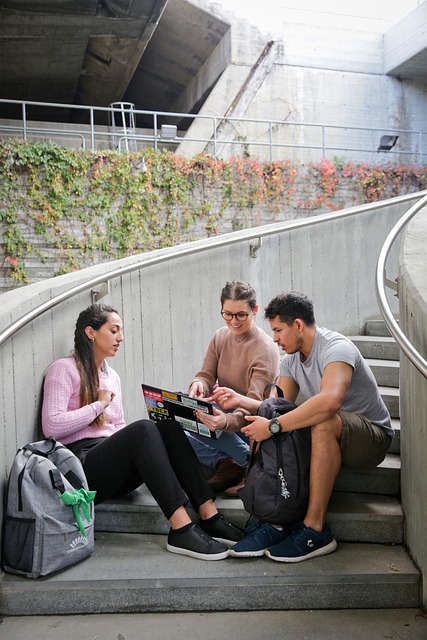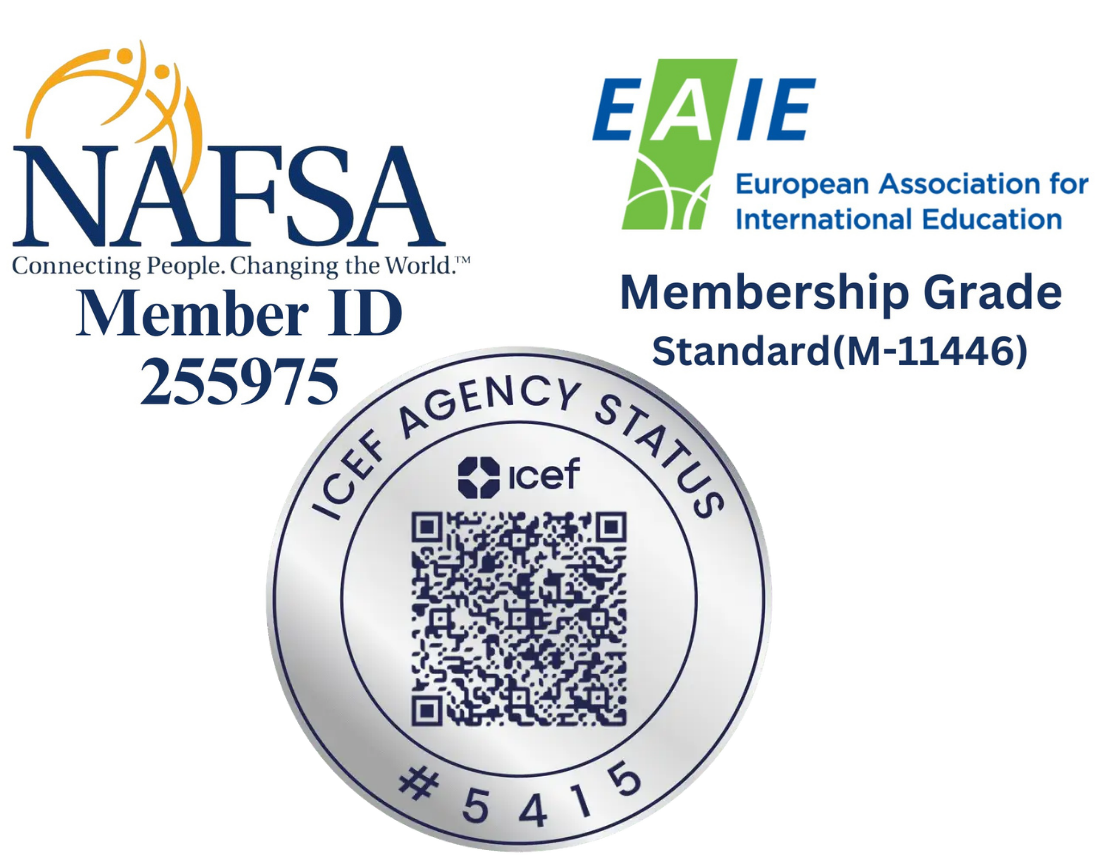Free Consultation for Student Visa
Our immigration experts are ready to assist you.
No Work Permit Visa we provide
- High success rate for student visa
- Ensure part time job with study
- Study with work up to 40 hours/week
- Low IELTS or without IELTS can apply
- Paid internships are available
- 3-4 years of post work permit
- Spouse can work full time scholarship available
- University offer letter within 7 days
Partnering with Global Excellence: Canada Immigration and Service Connections to Over 100 Top Universities Worldwide



ACADEMIC DESTINATIONS
STUDY IN CANADA
Did you know that Canada is now the Most Popular Study Destination in the world.
- High-Quality Education:
- Affordable Tuition Fees:
- Multicultural Environment
- Work Opportunities:
- Quality of Life:
- Global Rankings: According to the QS World University Rankings 2024, Canada has several universities in the top 100, including the University of Toronto (ranked 21st), the University of British Columbia (ranked 34th), and McGill University (ranked 31st).
- Tuition Costs: According to Statistics Canada, the average annual tuition fee for international undergraduate students in Canada for the 2023/2024 academic year was CAD 33,623 (approximately USD 26,700) .
- Scholarships: Numerous scholarships are available for international students, such as the Vanier Canada Graduate Scholarships (worth CAD 50,000 per year for three years).
- International Students: In 2022, Canada hosted over 622,000 international students, making it one of the most popular destinations for students globally .
- Ethnic Diversity: Cities like Toronto, Vancouver, and Montreal are known for their ethnic diversity, with over 200 languages spoken across the country.
- Work While Studying: International students can work up to 20 hours per week during the academic term and full-time during scheduled breaks without a separate work permit.
- Post-Graduation Work Permit Program (PGWPP): Graduates can obtain a work permit for up to three years, depending on the length of their study program, allowing them to gain valuable Canadian work experience .
- Safety and Peace: Canada ranks 10th on the Global Peace Index 2023, making it one of the safest countries in the world .
- Health and Well-Being: The OECD Better Life Index ranks Canada high in terms of life satisfaction, with a rating of 7.6 out of 10 .

Canada visa for Singaporeans — do you need one?
If you’re a Singaporean aspiring to study in Canada, you might be wondering whether you need a Canadian visa or if there’s an alternative pathway. The good news is that Singaporeans do not require a traditional Canadian visa to pursue their studies in Canada. However, study permits will be required for some individuals. Here’s a breakdown of the study permit requirements and the benefits they entail:
Study without a permit for up to six months: If your study programme lasts for less than six months, you can pursue your studies in Canada without a study permit, provided you hold valid visitor status. This requires either a visitor visa (temporary resident visa) or an electronic travel authorisation (eTA). And if your academic pursuit takes you to Quebec and your duration of study is under six months, you needn’t apply for a Quebec Acceptance Certificate (CAQ).
Study longer than six months: If your study programme surpasses six months, securing a study permit becomes mandatory. It’s important to note that a study permit isn’t a visa; upon approval, you’ll also receive a visitor visa (temporary resident visa) or an eTA based on your passport or travel document. Also, studying in Quebec mandates obtaining a CAQ.
Extending your study permit or changing status: When your study permit nears expiration, you have the option to:
Extend your study permit: If you wish to continue your studies, you can extend your study permit. Apply at least 30 days before the permit expires or even sooner if your plans are set.
Post-graduation work permit (PGWP): After completing your study programme, you may be eligible to apply for a PGWP, allowing you to gain valuable work experience in Canada.
Change to visitor status: If you’re not pursuing further studies or applying for a PGWP, you can apply to change your status to visitor.
STUDY IN AUSTRALIA
Did you know that Australia is now the 3rd Most Popular Study Destination in the world!
- High-Quality Education:
- Affordable Tuition Fees:
- Multicultural Environment
- Work Opportunities:
- Quality of Life:
- Global Rankings: According to the QS World University Rankings 2024, Australia has several universities in the top 100, including the Australian National University (ranked 34th), the University of Melbourne (ranked 37th), and the University of Sydney (ranked 42nd) .
- Tuition Costs: According to the Australian Government's Study in Australia website, the average annual tuition fee for international undergraduate students ranges from AUD 20,000 to AUD 45,000 (approximately USD 13,000 to USD 29,000).
- Scholarships: Australia offers a wide range of scholarships for international students, such as the Australia Awards Scholarships, which cover tuition fees, travel expenses, and living costs.
- International Students: In 2022, Australia hosted over 480,000 international students, making it one of the most popular study destinations worldwide .
- Ethnic Diversity: Major cities like Sydney, Melbourne, and Brisbane are known for their cultural diversity, with a significant percentage of residents born overseas.
- Work While Studying: International students can work up to 40 hours per fortnight during the academic term and unlimited hours during holidays.
- Post-Study Work Visa: Graduates can apply for a Temporary Graduate Visa (subclass 485), which allows them to work in Australia for up to four years after completing their studies .
- Safety and Peace: Australia ranks 13th on the Global Peace Index 2023, highlighting its safety and stability .
- Health and Well-Being: Australia consistently ranks high in the OECD Better Life Index, with strong ratings in health, community, and overall life satisfaction.

Everything you need to know about Australian Visas
The visa you need will depend on the type of study you want to do, and how long you want to stay in Australia. You can find out more about each type of visa on the Australian Government’s Department of Immigration and Border Protection (DIBP) website.
For Online Application
You will need to create an account using DIBP’s online application system – ImmiAccount – to complete and submit your student visa application. You can also track the status of your visa through ImmiAccount once you have submitted it.
The information you need for your visa application will depend on your nationality and which course you’re studying. You will generally need:
Proof of enrolment (your Electronic Confirmation of Enrolment)
Your health insurance (Overseas Student Health Cover) policy details
Your Genuine Temporary Entrant (GTE) statement
Evidence of your English skills
A valid passport
Your visa application fee
If you are under 18 years of age, you will also need to provide additional documents such as parental consent.
You can get a full list of what’s needed for your visa application from your IDP adviser or by using the Document checklist tool on the DIBP website
You should submit your application no later than six weeks before your course starts, and no earlier than 12 weeks.
.
STUDY IN UK
Did you know that the UK is home to four of the world’s top 10 universities, according to the QS World University Rankings?
- High-Quality Education:
- Affordable Tuition Fees:
- Multicultural Environment
- Work Opportunities:
- Quality of Life:
- Global Rankings: According to the QS World University Rankings 2024, the UK is home to four of the world's top 10 universities, with institutions like the University of Oxford (ranked 5th), the University of Cambridge (ranked 7th), and Imperial College London (ranked 8th).
- Tuition Costs: According to the UK Government's GOV.UK website, the average annual tuition fee for international students at a UK university is around £12,000-£15,000 (approximately USD 15,000-19,000).
- Scholarships: The UK Government offers various scholarships for international students, such as the Chevening Scholarships, which cover tuition fees, living costs, and travel expenses.
- International Students: In 2022, the UK welcomed over 470,000 international students, making it one of the most popular study destinations worldwide.
- Ethnic Diversity: Major cities like London and Manchester are known for their cultural diversity, with a significant percentage of residents born outside the UK. According to the Office for National Statistics (ONS), in 2020, 13.2% of the population in England and Wales were born outside the UK.
- Work While Studying: International students can work up to 20 hours per week during term time and full-time during holidays.
- Post-Study Work Visa: Graduates can apply for a Tier 2 (General) visa, which allows them to work in the UK for up to three years after completing their studies.
- Safety and Peace: The UK consistently ranks high on the Global Peace Index, with a score of 86.4 in 2023, highlighting its safety and stability.
- Health and Well-Being: The UK has a comprehensive National Health Service (NHS) and consistently ranks high in the OECD Better Life Index, with strong ratings in health, community, and overall life satisfaction.

UK visa for Singaporeans — All you need to know?
Singaporeans can visit the UK without a visa. Passport must be valid for the duration of your stay (We recommend that travellers should have at least six months passport validity). If you’re planning to visit the UK for more than six months, or for any purpose other than tourism, please refer to the UK Visas and Immigration website at https://www.gov.uk/browse/visas-immigration to ensure you apply for the appropriate visa.
As visa requirements often change at short notice, we advise you to contact your travel agency, or the British High Commission in Singapore for up-to-date information.
The UK is not part of the Schengen area, and a passport is required to travel between the UK and other European countries, including Ireland.
From 20 May 19, Singaporeans are eligible to use eGates at 15 air and rail ports in the UK for quicker automated immigration clearance into the UK. However, not everyone should use the eGates. In this regard, please check the UK Visas and Immigration website at https://www.gov.uk/government/publications/coming-to-the-uk/faster-travel-through-the-uk-border.
UK airports administer extensive security screening for passengers. If you are flying to the UK, allow extra time for extended screenings and luggage checks at your airport of departure. Check the UK Visas and Immigration website at https://www.gov.uk/browse/visas-immigration/arriving-in-the-uk for further information on these measures and on current hand luggage restrictions at UK airports.
You must declare to Customs:
- anything over your duty-free allowance
- banned or restricted goods in the UK, e.g. meat and dairy products from most non-EU countries
- goods that you plan to sell
- more than €10,000 (or its equivalent) in cash, if you’re coming from outside the EU
STUDY IN USA
Did you know that top 3 universities in the world are all located in the US, with Massachusetts Institute of Technology (MIT) taking the top spot, followed by Stanford University and Harvard University.
- High-Quality Education:
- Affordable Tuition Fees:
- Multicultural Environment
- Work Opportunities:
- Quality of Life:
- Global Rankings: According to the US News & World Report Best Colleges 2024, the United States is home to 5 of the world's top 10 universities, with institutions like Stanford University (ranked 2nd), Massachusetts Institute of Technology (MIT) (ranked 3rd), and Harvard University (ranked 5th).
- Tuition Costs: According to the Institute of International Education (IIE), the average annual tuition fee for international students at a US university is around $30,000-$50,000.
- Scholarships: The US Department of State's Bureau of Educational and Cultural Affairs offers various scholarships for international students, such as the Fulbright Program, which provides funding for tuition, living expenses, and travel.
- International Students: In 2022, the US welcomed over 1 million international students, making it one of the most popular study destinations worldwide.
- Ethnic Diversity: Major cities like New York and Los Angeles are known for their cultural diversity, with a significant percentage of residents born outside the US. According to the US Census Bureau, in 2020, 13.6% of the population in the United States were foreign-born.
- Work While Studying: International students can work up to 20 hours per week during term time and full-time during holidays.
- Post-Study Work Visa: Graduates can apply for an Optional Practical Training (OPT) visa, which allows them to work in the US for up to 12 months after completing their studies.
- Safety and Peace: The United States consistently ranks high on the Global Peace Index, with a score of 83.4 in 2023, highlighting its safety and stability.
- Health and Well-Being: The United States has a comprehensive healthcare system and consistently ranks high in the World Health Organization's (WHO) ranking of healthcare systems, with strong ratings in healthcare access, quality of care, and overall health outcomes.

USA study visa — What are the requirements?
If you’re planning to stay in the US for more than 90 days or if your visit involves work, study, or other activities that require a different visa, you’ll need to apply for the appropriate US visa.
The visa you need will depend on the type of study you want to do in the United States.
The U.S. Government offers three different student visa types:
F Student Visa: used to study at an accredited U.S. college or university or to study English at an English language institut
J Exchange Visa: for participation in an exchange program, including high school and university study
M Student Visa: for non-academic or vocational study or training in the U.S.
You must first apply and be accepted by a U.S. institution that is certified by the Student and Exchange Visitor Program (SEVP). Once accepted, you will receive a Form I-20 from the institution’s international student office, which is a paper record of your information in the database called the Student and Exchange Visitor Information System (SEVIS).
You will need the following documentation for your visa application:
A valid passport that is valid for at least six months beyond your period of stay in the U.S. (unless exempt by country specific agreements)
Acceptance at a SEVP approved school and your Form I-20
Application fee payment for the Student and Exchange Visitor Information System
Non-immigrant visa application and the Form DS-160 confirmation page
One or two photographs in the requested format
Additional documentation may also be required:
Academic preparation documents such as transcripts, diplomas, degrees or certificates
Evidence that you have sufficient funds to maintain your living expenses throughout the period of your stay in the U.S. This may include:
Bank statements
Financial undertaking by a sponsor to cover your accommodation and living costs
A scholarship program
Evidence that you will leave the U.S. once you have completed your course of study. This can be in the form of an air ticket out of the U.S. to your home country
You may also have to appear for a personal interview at the U.S. embassy or consulate. You can find out more about each type of visa on the U.S. Government’s Department of State website.
When you arrive in the U.S., you must:
Not enter the U.S. more than 30 days before your study program begins
Contact your designated school official when you first enter the U.S.
Contact your designated school official again, no later than the program start date listed on your Form I-20
Making sure your visa remains valid
Once you get your visa, there are a number of things you need to do to ensure it remains valid, including:
Fulfilling the purpose for why the Department of State issued the visa
Following the regulations associated with that purpose
While studying in the U.S., you will need to observe the following rules:
You must attend and pass all of your classes. If you are finding your studies too difficult, you should speak with your designated school official (DSO) immediately
If you think you will be unable to complete your program by the end date listed on your Form I-20, you must talk to your DSO about requesting a possible program extension
You must take a full course of study each term. If you cannot study full-time, contact your DSO immediately
You cannot drop below a full course of study without consulting with your DSO
STUDY IN NEW ZEALAND
Did you know that New Zealand is ranked among the top 10 countries in the world for entrepreneurship and innovation, according to the Global Innovation Index 2024, with a high score for business sophistication, human capital, and research and development?
- High-Quality Education:
- Affordable Tuition Fees:
- Multicultural Environment
- Work Opportunities:
- Quality of Life:
- Global Rankings: According to the QS World University Rankings 2024, the University of Auckland is ranked among the top 100 universities globally, with institutions like the University of Canterbury and the University of Otago also highly regarded.
- Tuition Costs: According to the New Zealand Government's website, the average annual tuition fee for international students at a New Zealand university is around NZ$25,000-NZ$35,000.
- Scholarships: The New Zealand Government offers various scholarships for international students, such as the New Zealand International Scholarship, which provides funding for tuition, living expenses, and travel.
- International Students: In 2022, New Zealand welcomed over 50,000 international students, making it a popular study destination in the Asia-Pacific region.
- Ethnic Diversity: Major cities like Auckland and Wellington are known for their cultural diversity, with a significant percentage of residents born outside of New Zealand. According to Statistics New Zealand, in 2020, 22.5% of the population in New Zealand were born overseas.
- Work While Studying: International students can work up to 20 hours per week during term time and full-time during holidays.
- Post-Study Work Visa: Graduates can apply for a post-study work visa, which allows them to work in New Zealand for up to 3 years after completing their studies.
- Safety and Peace: New Zealand consistently ranks high on the Global Peace Index, with a score of 93.3 in 2023, highlighting its safety and stability.
- Health and Well-Being: New Zealand has a comprehensive healthcare system and consistently ranks high in the World Health Organization's (WHO) ranking of healthcare systems, with strong ratings in healthcare access, quality of care, and overall health outcomes.

New Zealand study visas — details
Fee paying student visa
For students enrolling in full-time courses in New Zealand, the Fee Paying Student Visa is the most common choice. Applicants must have an offer from a recognised institution, proof of paid tuition, and evidence of sufficient funds for living expenses. Typically valid for the length of your course or up to four years. Extensions can be applied for if you’re progressing to a higher level of study.
Pathway student visa
This visa allows students to undertake up to three consecutive courses in New Zealand on a single visa. An offer from a Pathway Education Provider is required. The student must also have necessary funds for tuition for each course. Only specific institutions offer this type of visa programme. The courses should be one after another with minimal gaps between them.
Exchange student visa
Tailored for students participating in approved student exchange schemes. An offer through a recognised student exchange programme is essential. Students don’t need to show proof of funds. Partnered schools or universities should be part of approved exchange schemes. The visa duration aligns with the exchange programme, typically for a year.
Foreign government supported student visa
For students who are being sponsored by their home government. A confirmed scholarship or financial undertaking from a foreign government is needed. Specific programmes sponsored by foreign governments qualify. The duration generally depends on the length of the supported programme.
STUDY IN SINGAPORE
Did you know that Singapore is home to a world-class education system, with the country’s top-ranked universities, such as the National University of Singapore and Nanyang Technological University, attracting students from all over the world?
- High-Quality Education:
- Affordable Tuition Fees:
- Multicultural Environment
- Work Opportunities:
- Quality of Life:
- Global Rankings: According to the QS World University Rankings 2024, Singapore is home to some of the world's top universities, with institutions like the National University of Singapore and Nanyang Technological University consistently ranked among the top 50 globally.
- Tuition Costs: Singapore has a relatively low tuition fee compared to other countries, with an average annual tuition fee of around SGD $20,000-SGD $30,000.
- Scholarships: The Singapore Government offers various scholarships for international students, such as the Singapore International Student Scholarship, which provides funding for tuition, living expenses, and travel.
- International Students: Singapore has a diverse population of international students, with over 40,000 international students from around the world studying in Singapore.
- Ethnic Diversity: Singapore celebrates its multicultural heritage through various festivals and events throughout the year, showcasing its rich cultural diversity.
- Work While Studying: International students can work up to 16 hours per week during term time and full-time during holidays.
- Post-Study Work Visa: Graduates can apply for a post-study work visa, which allows them to work in Singapore for up to 2 years after completing their studies.
- Safety and Peace: Singapore is consistently ranked as one of the safest cities in the world, with a low crime rate and a strong sense of security.
- Health and Well-Being: Singapore has a comprehensive healthcare system, with a range of public and private healthcare providers offering high-quality medical care.
- Modern Infrastructure: Singapore has a well-developed infrastructure, with modern transportation systems, state-of-the-art facilities, and high-speed internet connectivity.


Head office: Singapore
Branch Offices: Canada, Indonesia & Philippines
Company
Resources
we are ICEF Certified

